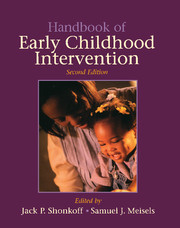Book contents
- Frontmatter
- Contents
- Foreword
- Preface
- Contributors
- PART ONE INTRODUCTION
- PART TWO CONCEPTS OF DEVELOPMENTAL VULNERABILITY AND RESILIENCE
- PART THREE THEORETICAL FRAMEWORKS FOR INTERVENTION
- 7 Transactional Regulation: The Developmental Ecology of Early Intervention
- 8 Guiding Principles for a Theory of Early Intervention: A Developmental–Psychoanalytic Perspective
- 9 Behavioral and Educational Approaches to Early Intervention
- 10 The Neurobiological Bases of Early Intervention
- PART FOUR APPROACHES TO ASSESSMENT
- PART FIVE SERVICE DELIVERY MODELS AND SYSTEMS
- PART SIX MEASURING THE IMPACT OF SERVICE DELIVERY
- PART SEVEN NEW DIRECTIONS FOR THE TWENTY-FIRST CENTURY
- Name Index
- Subject Index
8 - Guiding Principles for a Theory of Early Intervention: A Developmental–Psychoanalytic Perspective
Published online by Cambridge University Press: 05 November 2011
- Frontmatter
- Contents
- Foreword
- Preface
- Contributors
- PART ONE INTRODUCTION
- PART TWO CONCEPTS OF DEVELOPMENTAL VULNERABILITY AND RESILIENCE
- PART THREE THEORETICAL FRAMEWORKS FOR INTERVENTION
- 7 Transactional Regulation: The Developmental Ecology of Early Intervention
- 8 Guiding Principles for a Theory of Early Intervention: A Developmental–Psychoanalytic Perspective
- 9 Behavioral and Educational Approaches to Early Intervention
- 10 The Neurobiological Bases of Early Intervention
- PART FOUR APPROACHES TO ASSESSMENT
- PART FIVE SERVICE DELIVERY MODELS AND SYSTEMS
- PART SIX MEASURING THE IMPACT OF SERVICE DELIVERY
- PART SEVEN NEW DIRECTIONS FOR THE TWENTY-FIRST CENTURY
- Name Index
- Subject Index
Summary
This chapter presents some guiding principles for a theory of early intervention that result from a developmental psychoanalytic systems perspective. Psychoanalytic thinking has provided important incentives for such a perspective, but recent research has taken this thinking in surprising directions. Our goal is to articulate basic principles, relate them to traditional concerns of psychoanalysis, and update them with current perspectives from the developmental sciences.
A number of dialectical themes pervade our principles. First among these is the interplay of biology and culture. Development includes aspects of both domains, and it includes their dynamic influences on each other. All principles of intervention include this interplay. A second theme is the interplay of affiliation and control. Attachment research has emphasized the dimension of affiliation in the developing individual but, equally important, is the dimension of control or the child's developing sense of boundaries. From early infancy on the interventionist must consider both dimensions. A third can be thought of as the interplay of science and mystery in our work. We gain knowledge from our science, but the gain is always to some extent uncertain and singular because we as observers participate in creating that knowledge. Because of our transactions, there is always a zone of mystery. We attempt to minimize uncertainty in our knowledge by using multiple windows of observation and by applying differing methods and points of view.
Information
- Type
- Chapter
- Information
- Handbook of Early Childhood Intervention , pp. 160 - 178Publisher: Cambridge University PressPrint publication year: 2000
Accessibility standard: Unknown
Why this information is here
This section outlines the accessibility features of this content - including support for screen readers, full keyboard navigation and high-contrast display options. This may not be relevant for you.Accessibility Information
- 23
- Cited by
